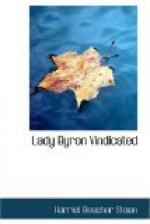We are asked now why she ever spoke at all. The fact that her story is known to several persons in England is brought up as if it were a crime. To this we answer, Lady Byron had an undoubted moral right to have exposed the whole story in a public court in 1816, and thus cut herself loose from her husband by a divorce. For the sake of saving her husband and sister from destruction, she waived this right to self-justification, and stood for years a silent sufferer under calumny and misrepresentation. She desired nothing but to retire from the whole subject; to be permitted to enjoy with her child the peace and seclusion that belong to her sex. Her husband made her, through his life and after his death, a subject of such constant discussion, that she must either abandon the current literature of her day, or run the risk of reading more or less about herself in almost every magazine of her time. Conversations with Lord Byron, notes of interviews with Lord Byron, journals of time spent with Lord Byron, were constantly spread before the public. Leigh Hunt, Galt, Medwin, Trelawney, Lady Blessington, Dr. Kennedy, and Thomas Moore, all poured forth their memorials; and in all she figured prominently. All these had their tribes of reviewers and critics, who also discussed her. The profound mystery of her silence seemed constantly to provoke inquiry. People could not forgive her for not speaking. Her privacy, retirement, and silence were set down as coldness, haughtiness, and contempt of human sympathy. She was constantly challenged to say something: as, for example, in the ‘Noctes’ of November 1825, six months after Byron’s death, Christopher North says, speaking of the burning of the Autobiography,—
’I think, since the Memoir was burned by these people, these people are bound to put us in possession of the best evidence they still have the power of producing, in order that we may come to a just conclusion as to a subject upon which, by their act, at least, as much as by any other people’s act, we are compelled to consider it our duty to make up our deliberate opinion,—deliberate and decisive. Woe be to those who provoke this curiosity, and will not allay it! Woe be to them! say I. Woe to them! says the world.’
When Lady Byron published her statement, which certainly seemed called for by this language, Christopher North blamed her for doing it, and then again said that she ought to go on and tell the whole story. If she was thus adjured to speak, blamed for speaking, and adjured to speak further, all in one breath, by public prints, there is reason to think that there could not have come less solicitation from private sources,—from friends who had access to her at all hours, whom she loved, by whom she was beloved, and to whom her refusal to explain might seem a breach of friendship. Yet there is no evidence on record, that we have seen, that she ever had other confidant than her legal counsel, till after all the actors in the events were in their graves, and the daughter, for whose sake largely the secret was guarded, had followed them.




